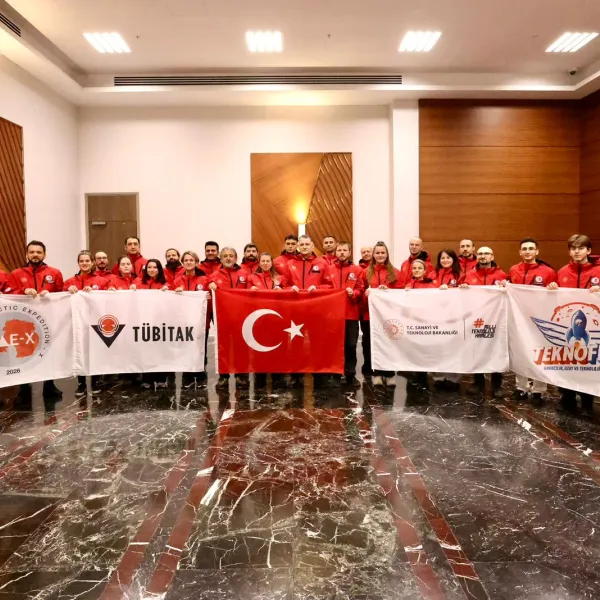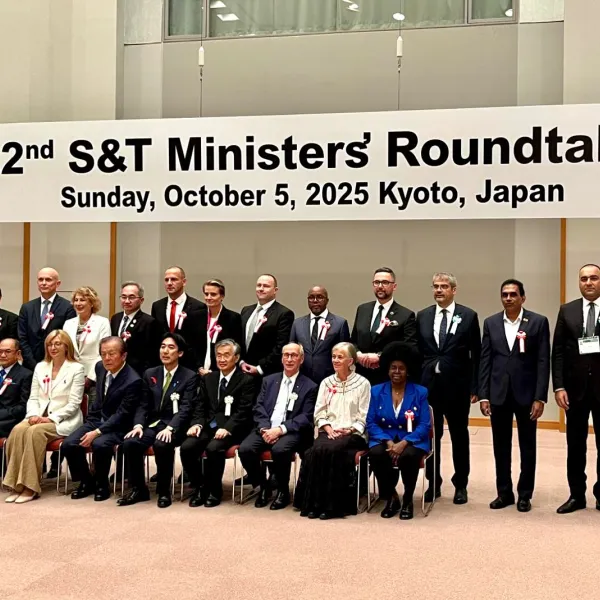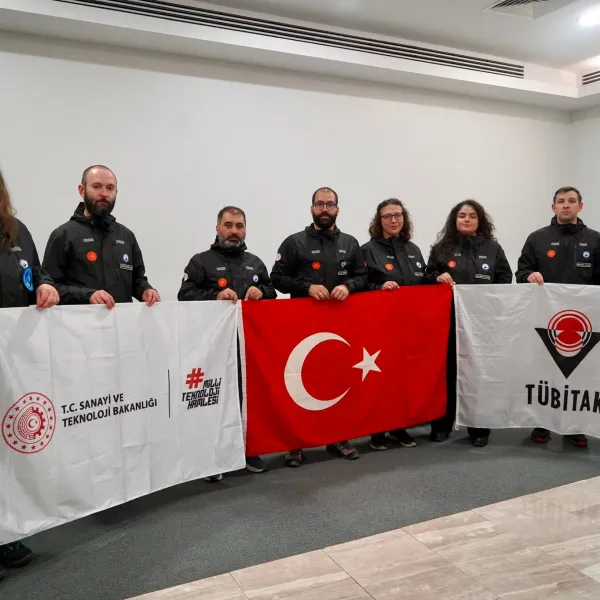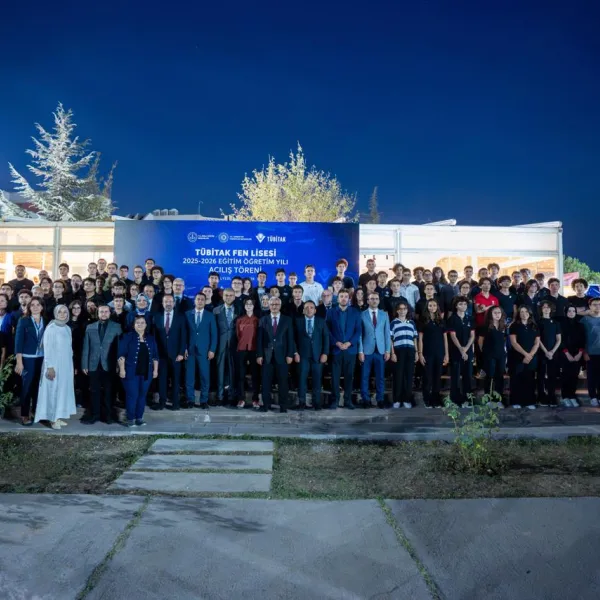
Mehmet Fatih Kacır, the Minister of Industry and Technology, stated that the Turkish team conducting the 3rd National Arctic Scientific Research Expedition (TASE-III) returned with significant results and emphasized, "We have successfully completed the expedition. Just as in many other fields, Türkiye will continue to be a pioneering country in scientific research." Kacır provided an assessment of the activities of the scientific team that carried out the Arctic Expedition lasting about a month.
Kacır noted that the expedition team, consisting of research institutions, universities, and foreign scientists participating through bilateral cooperation from TÜBİTAK, Turkish Naval Forces, Turkish State Meteorological Service, and Anadolu Agency, conducted scientific studies by taking samples and measurements at 28 stations, and stated that these studies will yield results that will shed light on the future of the world. Kacır also mentioned that the expedition team conducted scientific research for 14 different projects at sampling points in the Barents Sea, saying, "Our team investigated various topics ranging from the ecosystem in the Arctic Ocean to the conditions of marine ecosystem, meteorological parameters, and atmospheric pollution. We have successfully completed the expedition. Just as in many other fields, Türkiye will continue to be a pioneering country in scientific research. As the government, we attach great importance to scientific research. We are taking steps that will contribute to the world's scientific literature. Both our Antarctic and Arctic expeditions are evidence of this understanding."
Kacır emphasized that the expedition included research on climate change and environmental pollution, stating that findings, including the identification of pollutants at sea, microplastics, and observations of sea ice, will contribute to those conducting research in these areas. He mentioned that work was conducted at 28 different sampling points, saying, "The polar regions have special significance for our scientists due to their being the fastest-changing regions in terms of climate and the diverse living organisms they host. At the same time, the Arctic region hosts one-third of the world's hydrocarbon reserves. The Northern Sea Route, which has gained prominence in recent times, seems to be one of the new trade routes. In such a strategic region, Türkiye will have a voice with scientific research.
Polar regions are important in the fight against climate change
Kacır emphasized that scientific research revealed that polar regions are affected by global climate change more than twice when compared to other regions, stating, "The fact that both these effects can be more clearly observed and that the two polar regions are considered as a whole makes this region valuable in terms of scientific research. Considering that the effects of global climate change are not limited to polar regions, conducting research in these areas to generate data that will shed light on the future is important for all middle-latitude countries, including Türkiye."
Kacır highlighted that research during the research in the expedition covered areas such as microplastics, biodiversity, air quality, marine pollution, renewable energy, maritime, and oceanography. He mentioned that within the scope of the expedition, sea water samples collected from various points would undergo analysis at TÜBİTAK MAM laboratories to determine parameters such as heavy metals, nutrient elements, and suspended solids, which are used to investigate the levels of anthropogenic pollution in environmentally impacted areas. Additionally, physical parameters of sea water such as temperature, dissolved oxygen, pH level, conductivity, and salinity that affect the ecosystem were measured at these points. Kacır also noted that one of the research topics within the scope of the expedition was the study of the bacterial diversity that degrade these microplastics, mentioning, "The results obtained from bacteria adapted to cold climate conditions may contribute to biotechnological studies in reducing plastic pollution in the oceans. The changes in the environmental conditions in the Barents Sea were examined through the use of Unmanned Aerial Vehicles (UAVs) with the help of aerial photographs taken during the expedition, and these data will be used in research with the current satellite images covering wide areas. The data will be verified with ground-based measurements, revealing the spatial distribution of environmental changes in the region."
Kacır explained that with the help of the "Automatic Meteorological Observation Station" installed on the ship during the expedition, parameters such as wind speed, air temperature, humidity, pressure, and sea water temperature were measured and recorded. He added that these records, with their resolution suitable for the current low-resolution terrestrial data in the Arctic, would contribute to climate change effects being observed locally and tested against climate models and remote sensing studies in this rapidly growing region in terms of maritime traffic.
Investigating the potential of solar energy use
TÜBİTAK President Prof. Dr. Hasan Mandal stated that the Directorate of Navigation, Hydrography, and Oceanography of the Turkish Naval Forces conducted measurements of parameters such as color, light refraction, and visibility distance on the sea surface, noting, "Due to almost 95% of seas and oceans where the majority of world transportation takes place not being mapped, the measurements made during the expedition will not only test the consistency of satellite-derived bathymetric data but also contribute to the production of new maps through remote sensing in this region where maritime traffic is rapidly increasing." Mandal mentioned that during the expedition, the monitoring of the implementation of legislation related to open sea fishing in the Arctic Ocean, and evaluations based on expert opinions collected from individuals engaged in fishing activities in the region, were carried out. He explained that continuous measurement systems installed on the ship were used to measure particulate matter in the air for determining the level of air pollution on the expedition route, adding, "These annual measurements will reveal the effects of industrial and maritime transportation activities on air quality in the region. The data obtained from UV radiation measurements conducted during the expedition will compare changes in both polar regions and investigate atmospheric factors affecting this parameter on a seasonal basis. In addition, measurements were made on photovoltaic thermal collectors, providing information about the potential use of solar energy and equivalent carbon emission values in polar regions as a renewable energy source."
Mandal stated that within the framework of the "TÜBİTAK 2204-D High School Students Climate Change Research Projects," a material developed as part of a project that won first place at the TEKNOFEST Türkiye finals was tested in the Arctic region for the first time. He mentioned that visual materials were collected with the aim of developing education and awareness activities related to the polar regions.
Researchers from 3 different countries participated
Mandal drew attention to the participation of researchers from Brazil, the Czech Republic, and Norway in the expedition, saying, "Foreign researchers conducted studies during the expedition on the genetic diversity of fish adapted to cold conditions in the Barents Sea, the impact of global climate change on phytoplankton distribution and diversity, the application and identification of maritime legislation in polar regions, and their shortcomings. In addition, in collaboration with the Italian Institute for Polar Research, sea water and phytoplankton samples were collected and delivered to the Dirigible Arctic Research Station in Ny-Ålesund. These collaborations internationalized the expedition and contributed to our country's efforts in science diplomacy. The ongoing process of becoming a party to the Svalbard (Spitsbergen) Treaty and the continued acceleration of scientific activities in the region lay solid foundations for Türkiye.





